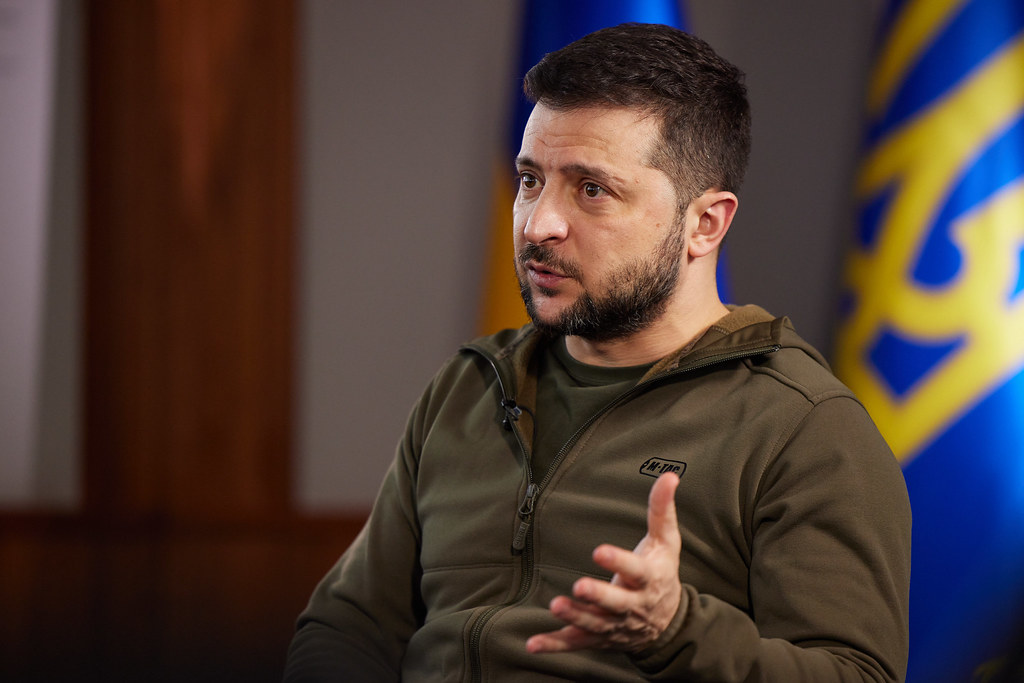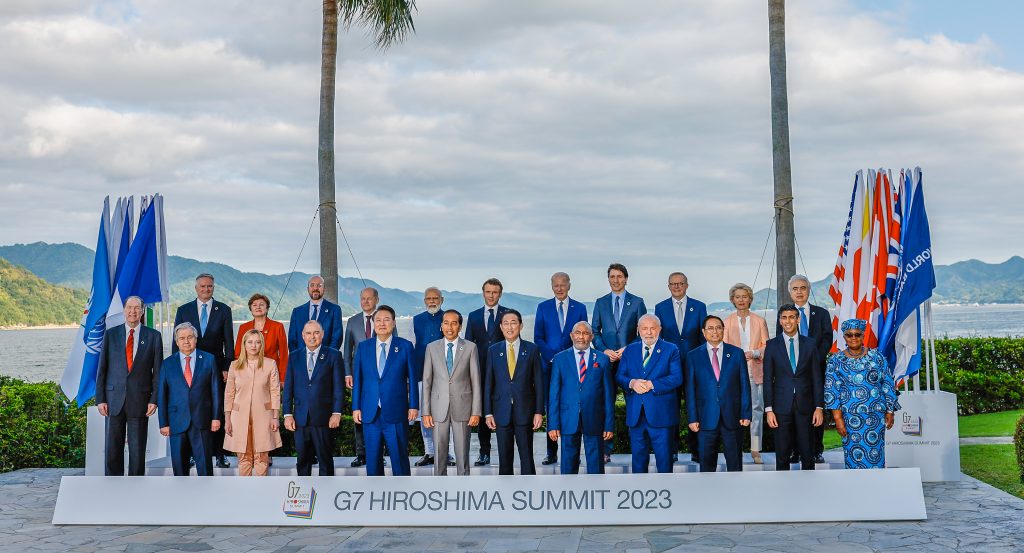Zelensky steals the spotlight at G7 summit, leaders indirectly caution China.
Ukraine’s President Zelensky joins major democracies at G7 summit in Japan, aiming for unity against Russia and China.
G7 talks in Hiroshima address global issues, including countering Beijing’s assertiveness and addressing the ongoing war in Europe.
Zelensky’s arrival emphasizes the need for Western unity in the face of Russian aggression.

G7 issues a joint communique strongly condemning Russia’s war on Ukraine and expressing unwavering support for Ukraine’s pursuit of peace.
Sanctions against Moscow announced, with US providing military support, including F16 fighter jets and training for Ukrainian pilots.
Biden expected to unveil a $375 million military aid package for Ukraine after Zelensky’s speech.
G7 leaders also discuss climate change and emerging technologies alongside the Ukraine crisis.
Ukrainian president arrives in Hiroshima via French government plane, following a stopover in Saudi Arabia.
G7 leaders issue early statement condemning Russia due to Zelensky’s impromptu visit.
Leaders caution against “economic coercion” allegedly practiced by Beijing towards several nations.
This year’s G7 summit expands invitations to emerging economies in the Global South, India, and Australia.

Ukraine war takes top priority, with Zelensky’s sudden appearance adding significance and urgency to discussions, along with his celebrity status.
Zelensky’s arrival coincides with the US announcement of training Ukrainian pilots on American-made F-16 fighter jets and allies’ provision of advanced warplanes to Kyiv, triggering condemnation from Russia and praise from Zelensky as a “historic” move.
Amidst speculation, Zelensky’s trip to Japan dominates news cycle for 24 hours.
Conflicting signals from Ukrainian officials create uncertainty over his visit, indicating a sudden decision despite discussions with Japanese PM weeks ago.
Exact arrival time kept secret until Japanese TV stations reveal live footage of Zelensky landing at Hiroshima airport on a plane loaned by ally Macron.
Zelensky swiftly engages in one-on-one meetings with various world leaders, including a friendly exchange with British PM Rishi Sunak.
Zelensky’s presence not only energizes diplomatic proceedings but also overshadows them.
G7 leaders unconcerned about failed sanctions against Russia, pledge to “starve” its “war machine” remains ambiguous.
Leaders’ physical proximity to Zelensky sends a strong message to Moscow that they are serious.
Message also aimed at China, Moscow’s ally.
Final statement emphasizes commitment to nuclear non-proliferation, climate change, and Indo-Pacific region.
Invitation of countries like Indonesia, India, and the Cook Islands illustrates dedication to the region.
Leaders express support for South East Asian and Pacific nations, targeted by China’s influence, and advocate for a “free and open Indo-Pacific” in response to territorial claims in the South China Sea.
They strongly condemn “economic coercion” and urge China to abide by international rules.
Commitment to “economic resilience” highlighted, including efforts to reduce dependence on critical supply chains linked to China.
Leaders emphasize desire for constructive and stable relations with China, clarifying their policies aim neither to harm China nor impede its economic progress and development.
China expresses “strong dissatisfaction” with G7’s joint statement and lodges complaint with summit organizer Japan, according to Beijing’s foreign ministry.
Foreign ministry spokesman accuses G7 of manipulating China-related issues, smearing and attacking China.
Summit concludes on Sunday, with expected speeches from Zelensky, President Biden, and PM Kishida.
A unified stance on China?
G7 summit’s focus extends beyond Russia to include China.
Differences persist between the US and Europe in managing their relationships with China.
Joint communique emphasizes countering “economic coercion” and protecting advanced technologies, while expressing the need for cooperation with Beijing.
Leaders caution against interference activities that undermine democratic institutions and economic prosperity, alluding to recent allegations against China.
Separate statement on economic security targets Beijing’s leadership, highlighting concerns over supply chain resilience, harmful industrial subsidies, and protection of sensitive technologies.
Western leaders frame measures as a response to China’s economic practices and coercive diplomacy.
China pushes back ahead of G7 discussions, accusing the US of coercive diplomacy.
Russian Foreign Minister sees G7 decisions as a deterrent to Russia and China, citing a goal of Western global dominance.
SOURCE: BBC AND NEWS AGENCIES


